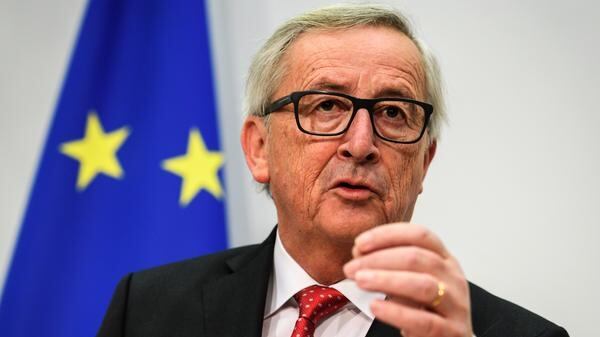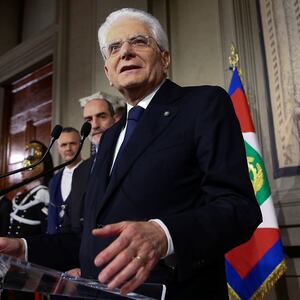ROME—Just before midnight Monday, Italy’s eurosceptic government submitted its budget for approval by the European Commission, and no one in Brussels knew quite what to expect. They had been dreading this day for months given the campaign promises made by Italy’s populist ruling coalition between the maverick Five Star Movement and the far-right League. Italian budgets often are cause for fiscal consternation.
Then, after looking at the numbers, EC President Jean-Claude Juncker suggested patience is wearing thin. “We were very kind, gentle, and positive when it came to Italy,” he told a press conference on Thursday, “because, well, Italy is Italy.”
The populist government’s budget far exceeded the commission’s fears. Not only does it fall far short of the EC’s recommendation that Rome keep its budget deficit at 1.6 percent of GDP—it comes in at 2.4 percent—the budget includes the do-or-die promise of a guaranteed income supplement of $900 a month for Italy’s lowest wage earners and a higher pension minimum payment, without saying how either will be funded.
ADVERTISEMENT
The guaranteed wage was an integral part of the Five Star’s success at the polls. In fact, the morning after elections last March, hundreds of Five Star voters lined up at their local tax offices ready to collect the handout. Seven months later, the Five Star leaders know their political fate rests on delivering on the guaranteed income, even if it means defying Brussels.
The guaranteed income was never on the League’s agenda, but party leader Matteo Salvini is backing it for the moment so he can stay in power as he builds support. His approval rate has been climbing steadily since taking office in June, primarily because of his hard line on immigration and his vow not to be “bullied by Brussels.”
Salvini and Five Star leader Luigi Di Maio have had their own internal struggles, most recently Friday when Di Maio suggested the final budget that went to Brussels had been changed behind his back without his approval, calling it a change made by “a mysterious hand.” Salvini suggested that maybe it was the Five Star leader who had forgotten what was written or that maybe changed his mind.
If the coalition fractures and the government falls, polls suggest that Salvini is in a power position to go it alone if new elections are called. When sneers about the new budget started surfacing even before Italy submitted it, Salvini won even more support at a party rally. “If Brussels says I cannot do it, I do not care,” he said. “I will do it anyway.”
Italian prime minister Giuseppe Conte echoed those remarks, telling reporters in Brussels that there “was no room for change” on the budget. “For once, the Italian people will come first.”
It’s becoming increasingly clear that Brussels knows that, too, but doesn’t exactly care either.
In a sharply worded “Dear Italy” letter issued Thursday night, EC Vice President Valdis Dombrovskis wrote of the commission’s concerns over Italy’s “obvious significant deviation” from the recommendations adopted by the Council under the Stability and Growth Pact. The letter went on to remind Italy that it had been forgiven in the past for overspending and rule-bending, and now needed to get in line, or at least pretend it would try. The letter from Brussels to Italy was not so much a shot across the bow as a declaration of war.
But that plays to Salvini’s defiant attitude, and he wants more than just a battle, he wants to emerge king. On a state visit to Moscow this week to rail against European sanctions against Russia, he said he’s even thinking of running for E.C. president in European parliamentary elections in May when Juncker’s term ends. That someone so anti-Europe as Salvini could be even considered for such a post speaks volumes about the direction the European Union is headed.
Salvini’s dream to lead the European Commission is fueled by Trump architect Steve Bannon, whose time spent in Europe over the past year seems to be paying off.
In September, Salvini signed on to Bannon’s alt-right European “Movement” which is a “loose association” that promises to provide “polling, data analytics and messaging strategies” for emerging right-wing leaders. Bannon’s Brussels-based group will create what he calls war rooms and help with fundraising strategies. He told an alt-right gathering in Rome that Italy’s populist success is a model for the rest of the world. “In Brexit and Trump, and what you voted for [in Italy] in March of 2018, is all of a piece, it’s a rejection of the way things are,” Bannon told the alt-right crowd. “It’s the little guy saying we have a better idea.”
Italy now has until Monday to respond to the EC letter and explain how it is going to keep European targets and fulfil the fiscal obligations of EU membership that are agreed upon by all member states-—or not. Juncker hinted that he wasn’t expecting miracles, but that the commission would also work with Italy once again.
"I think the Italians are actually in a very strong negotiation position,” Rathbones analyst Bryn Jones told CNBC on Friday. “I think it is important the European Union give them some leeway.”
The EC might have no other choice. “Today, Europe sent a letter to Italy saying our economic plan is no good,” Salvini told a campaign rally in Bolzano on Thursday night ahead of regional elections. “Every proud and courageous vote from Trento and Bolzano for the League is a message to the lords of Brussels to say, ‘Italians decide for Italy, do not bust our balls, let us work.’ They will never have Italy as a servant, frightened, unemployed, angry, on its knees. That moment is over.”







